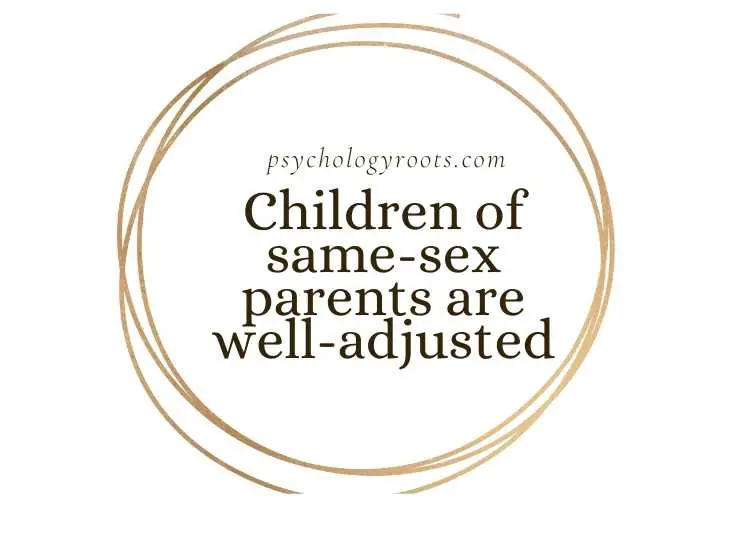Table of Contents
Children of same-sex parents are well-adjusted
Here in this post, we are discussing “Children of same-sex parents are well-adjusted”. You can read more about psychology-related material on our website. Keep visiting Psychology Roots.
According to the findings of a study conducted by Dr. Mirjam Fischer and her colleagues at the Institute of Sociology and Social Psychology (ISS) at the University of Cologne, children and adolescents who have both parents of the same gender are just as well adjusted as those who have parents of different genders. In this study, 62 children ranging in age from six to sixteen with same-sex parents were compared to 72 peers with different-sex parents in terms of prosocial behaviour, hyperactivity, peer problems, emotional adjustment, and general behavioural issues. The participants’ parents were of different sexes. The findings of the research project entitled “Behavioral Outcomes of Children with Same-Sex Parents in The Netherlands” were recently published in the International Journal of Environmental Research and Public Health.

Children of same-sex parents are well-adjusted
Previous research has revealed that same-sex parents confront major stress factors related to their sexual orientation. These issues include encounters with discrimination and legal circumstances that are not supportive of their parenting choices. This additional stress leads, on average, to lower physical and mental health for same-sex parents, which, in turn, might contribute to adjustment issues in the children of those parents.
“It is abundantly obvious that the current results demonstrate that same-sex families have powerful coping mechanisms that they use to safeguard their children from the existing legal obstacles and social rejection.” For instance, parents may foster an environment in which their children are appreciated and recognised by others, as well as an atmosphere in which children from other same-sex families serve as good examples. However, Fischer argues that it shouldn’t be essential for parents to have to adopt these tactics in the first place.
Due to the fact that the research was conducted using one-of-a-kind survey data obtained from Dutch civil registries, it was possible to get findings that are typical of families with parents who were between the ages of 30 and 65. The findings are consistent with the high number of study outcomes that are not typical of the whole.
Because of this, the researchers suggest that academics and policy makers shift away from comparisons between families of the same sex and families of different sexes that are driven by deficits. Instead, support services for same-sex families should build on the resilience systems that are already in place in these families and further develop them.
Help Us Improve This Article
Have you discovered an inaccuracy? We put out great effort to give accurate and scientifically trustworthy information to our readers. Please notify us if you discover any typographical or grammatical errors.
Make a comment. We acknowledge and appreciate your efforts.
If you have any scale or any material related to psychology kindly share it with us at psychologyroots@gmail.com. We help others on behalf of you.